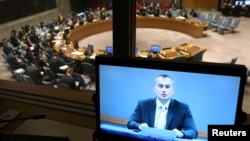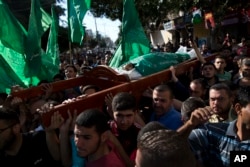The United Nations envoy for the Middle East peace process warned Wednesday that the Gaza Strip “is on the verge of collapse” and urged the international community to prevent conflict from erupting there again.
“We must act urgently to avoid another war, to alleviate the suffering of people and to empower the Palestinian government to take up its responsibilities in Gaza,” Nickolay Mladenov told a U.N. Security Council meeting on the subject.
Violence has spiraled in the Palestinian territory over the past weeks, as tens of thousands of protesters have demonstrated each Friday at a border fence separating Gaza from Israel. The protests began in the lead-up to the 70th anniversary of Israel’s creation on May 14.
Deaths, injuries
The U.N. said 76 Palestinians, including 11 children, have been killed by Israel Defense Forces (IDF), and more than 3,000 injured by live fire and other means in the past month.
“This period has seen by far the worst levels of violence since 2014,” Mladenov said.
The U.N. Security Council is discussing a Kuwaiti-drafted resolution calling for an “international protection mission” to be deployed to the Palestinian territories to protect civilians. It was not immediately clear what that mission would entail or whether it would have the necessary support within the council.
Mladenov urged both Israel and the militant group Hamas, which governs the Gaza Strip, to show maximum restraint.
“Israel has the responsibility to calibrate its use of force, to not use lethal force except as a last resort under imminent threat of death or serious injury,” he said. “Hamas, which controls Gaza, must not use the protests as cover to attempt to place bombs at the fence and create provocations. Its operatives must not hide among the demonstrators and risk the lives of civilians."
The U.N. envoy urged the international community to work quickly to improve the collapsing infrastructure in Gaza -- especially electricity, water and health care -- in order to reduce tensions and the risk for another war.
Gaza has experienced conflict four times in the past 12 years.
Frustrations growing
Mladenov noted that Palestinians are experiencing frustration and hardships not just in the territories, but also in Syria, Lebanon and Jordan, as U.S. funding cuts to the U.N. agency for Palestinian refugees (UNRWA) have affected its operations.
In January, the U.S., UNRWA’s single largest contributor, announced that it would withhold 83 percent of its 2018 annual contribution - about $300 million - throwing the agency into a financial crisis.
The agency began a fundraising campaign last week to coincide with the Muslim holy month of Ramadan, in a bid to avoid disrupting services to more than 5 million registered Palestinian refugees in the region.
Health care is of particular concern, as hospitals in Gaza have been struggling to assist all the wounded protesters.
“Thousands of regular interventions - surgical or others - have been suspended or canceled because of the need to focus on the injured and the many surgeries and follow-up treatments they require,” UNRWA Commissioner General Pierre Krahenbuhl told reporters Tuesday in Gaza. He said the health care system in Gaza is at a “breaking point.”






